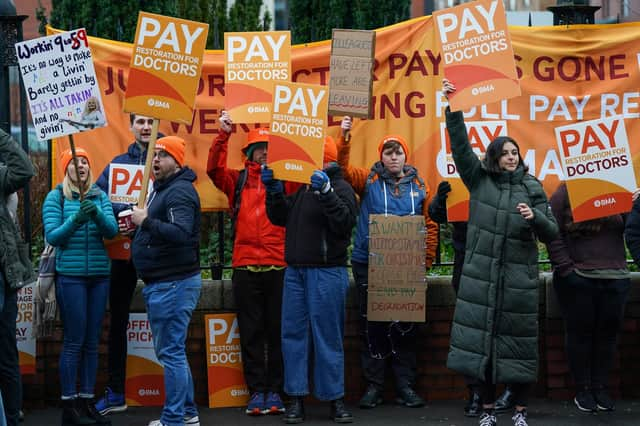NHS's ethos of altruism being destroyed by militant doctors and UK Government's free market approach to healthcare – Professor Anthony Seaton


Members of my family have worked in the NHS since its inception in 1947. Long before that, in 1869, my Glaswegian great-grandfather addressed his new medical students: “To prevent and cure disease and to alleviate pain and suffering present a field of labour of the noblest kind. In the pursuit of these objectives, you must be prepared to exercise much self-denial; to spend anxious days and not unfrequently watchful sleepless nights; to be ever ready at the call of duty however inopportunely that call may come.” He explained that medicine rarely offered rich rewards other than the gratitude of patients.
Three generations later, in 2007, I echoed this to the graduating medical class in Aberdeen. I spoke of professionalism, which during the Industrial Revolution “…acquired a deeper meaning as the professional ideal, in order to differentiate the activities of the entrepreneur from those of the doctors and academics whose activities and skills were devoted in a disinterested manner to the service of their fellow man and woman, especially those less privileged than themselves. I am sure that this understanding of professionalism is what motivated you to enter this profession and I hope it will sustain you through your careers.”
Advertisement
Hide AdAdvertisement
Hide AdWas I being overly optimistic? No – they rose to the challenge during the pandemic and many, especially in Scotland, have declined to strike. When working in the USA in 1970, I found many students had entered medicine from a desire to make a good living rather than a sense of a vocation. Doctors were suspected of inflicting unnecessary procedures on their patients for personal gain. As someone who as a young NHS consultant in the 1970s opposed a call from the British Medical Association (BMA) to strike, I am afraid that the behaviour of some young doctors in England today risks turning public opinion against them.
Progressive privatisation in England
To appear on picket lines, laughing and chanting mindless slogans, to attribute their minimum income to all, is to deceive the public and is unprofessional. It is cynical to wave banners saying ‘Save the NHS’ when your behaviour has the opposite effect. Much has happened to the NHS to lead to this discontent, but nothing excuses the unethical behaviour of refusing to care for their patients.
Many factors have led to the present impasse in England. The BMA has apparently been taken over by militant youths posing as downtrodden workers who seem not to care if they wreck the NHS and who ignore the effects on their patients. On the other side, successive governments must take responsibility for both the behaviour of their workers and their working conditions.
The NHS has aims that are never fully achievable but are an ideal that can be approached by the effective and supportive use of dedicated and altruistic staff. Those crucial adjectives have been forgotten. The market approach to healthcare, the degradation of general practice, the loss of team responsibility for patients in hospital services, the demolition of social care, the progressive privatisation of the NHS in England, and increasing militancy have all been destructive. Competition in a system which relies on collaboration and cooperation has been destructive of the altruism and dedication of the workforce.
The selection of medical students has apparently lost sight of the essential concept of vocation, resulting in inclusion in the present generation of some young doctors who appear to be unaware of the need for an arduous apprenticeship before they can be certified competent to take full responsibility for patients. Medicine is learnt by practice under supervision. Some junior doctors would persuade the public that they are fully competent – those of us who have been through it all ourselves and have been responsible for training them know otherwise.
Loss of modern medicine
The loss of the NHS would be a major step in the regression of the United Kingdom to Third World status. My forbears provided healthcare before the NHS, in conditions seen in poor countries today. They would not have believed the benefits to patients and employees provided now by the NHS. Let us not forget that it has made possible the extraordinary speed with which new treatments and vaccines have been introduced. If we lose the NHS, we lose modern medicine in the UK and the poorest will suffer the most.
Not since 1945 has the UK Government been presented with such a challenge. The social and economic decline – of which the problems of the NHS are a symptom – the stresses from war, the pandemic and climate change demand radical action. We need leadership, and if possible consensus, that provides a practical way forward. Only then can we start to rebuild the NHS. Otherwise, we can expect disgruntled doctors to emigrate to countries that tolerate them, to be replaced by enthusiastic doctors immigrating from poorer countries.
The structural problems that have led to this are vast and unlikely to be solved in a negotiation over pay between the present UK Government and the BMA. The national administrators of the NHS and the Royal Colleges of medical specialties should now be talking to those who might soon hold power to seek a way forward. Salaries are a small part of this. Little time is left, and what happens in England is bound to have consequences in Scotland. We need to rekindle the concept of the professional ideal and the motivation of the rather silent majority of British doctors and nurses who responded to the pandemic.
Anthony Seaton is a retired chest physician and professor of environmental medicine
Comments
Want to join the conversation? Please or to comment on this article.